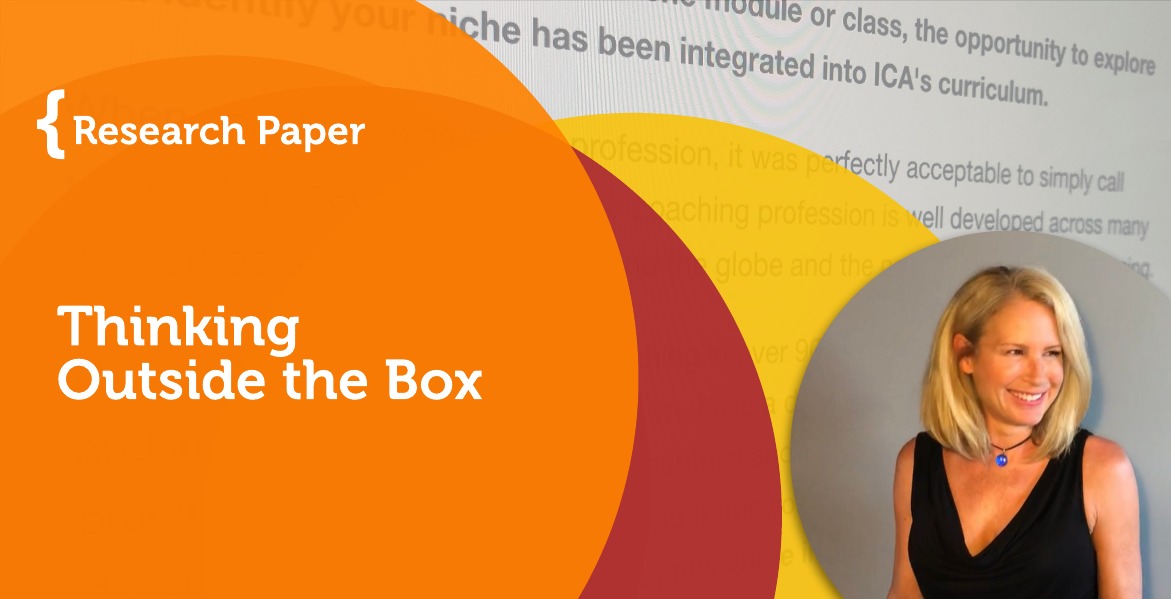Research Paper By Amy Lechelt
(Transformation Coach, UNITED STATES)
Definition: to explore ideas that are creative and unusual and that are not limited or controlled by rules or tradition. Merriam-Webster
Synonyms: creative thinking, mentation, intellection, divergent thinking, creativeness, cerebration, thought process, creativity, thinking, thought. synonym.com
Thinking outside of the box has been a modality for me most of my life. Although, I suppose I wasn’t always aware of it, nor the fact that I prefer to navigate life in this fashion. As I continue to grow older, meander through life’s twists and turns and watch the world and people overcome life’s challenges, I am a full believer of the concept out-of-box-thinking.
Am I wrong for thinking out the box from where I stay?
Am I wrong for saying that I’ll choose another way?
Just cause everybody doing what they all do
If 1 thing I know, how far I would grow?
I’m walking down this road of mine, this road that I call home.
So am I wrong for thinking that we could be something for real?
Now am I wrong for trying to reach the things that I can’t see?
But, that’s just how I feel, that’s just how I feel.
That’s just how I feel trying to torch the things that I can’t see.
If you tell me I’m wrong I don’t want to be right.
Am I wrong (song), Nico & Vinz
When thinking outside the box, it may provoke thoughts beyond what you had believed you were capable of achieving. I pose the question “What if you removed your self-limitations or beliefs regarding what you are able and want to achieve?”. Perhaps, “limitless”, may become an option to explore? How would it feel to be limitless? What then, with a shift of perspective would you choose to achieve, dream, or desire?
Pose the question, then question the pose. My friend, Jay M.
In considering fear, how has fear dictated the choices or decisions you’ve made? If in fact, you were to approach the proverbial fork in the road, would you choose the road less traveled? What if you were to embrace mistakes and the learning from them? With a shift a perspective, perhaps they weren’t mistakes at all; perhaps they were lessons.
Exploration takes courage and vulnerability. In “Daring Greatly”, Brené Brown describes vulnerability as “uncertainty, risk, and emotional exposure. It’s that unstable feeling we get when we step out of our comfort zone or do something that forces us to loosen control.” *If choosing to embrace your freedom of thought, speech, imagination, etc., sans fear, would help create what you want, what then would stop you?
He knew sometimes some fear can be good. When you are afraid things are going to get worse if you don’t do something, it can prompt you into action. But it is not good when you are afraid that it keeps you from doing anything.
Life moves on and so should we!
Spencer Johnson, Who Moved My Cheese?
Covid19 and the “New-Normal”
COVID 19. In my opinion, this presents an apropos moment in time for thinking outside the box (health risk aside). I have never experienced such a profound abyss as this in my lifetime. However, with a shift in perspective, one may consider this an indirectly-opportune time to begin opening one’s mind to possibility; whether by individual choice or employment-direction. A possible moment to break-free from our comfort zones, in a world that is currently without the safety of “a box”. I have been seeing the world coming together through music, at-home-play, empathy, etc., via the use of newer communication technology, social media, and business-shifting while relocating and reevaluating their cheese, if you will.
If you view things as unchangeable, then nothing will ever change for the better. By thinking outside the box and questioning the status quo, you’ll constantly be considering how you could improve an experience, product, or service. This allows you to keep growing — and can lead to intelligent and forward-thinking decisions in business. Timothy Sykes, entrepreneur.com
Some may view embracing change as difficult, although it may also be regarded as a learning and personal growth opportunity. As well, perhaps a consideration of answering “yes”, to new ideas rather than “no”, will prompt us to step outside the fears that no longer serve us. Possibly consider nature vs. nurture, expectations, truth vs. belief, and our authenticity.
Escape competition through authenticity. When you’re competing with people it’s because you’re copying them. The more authentic you are the less competition you’re going to have.
Naval Ravikant on his Naval podcast
Business and Innovative Thinking
People believe thinking outside the box takes intelligence and creativity, but it’s mostly about independence. When you simply ignore the box and build your reasoning from scratch, whether you’re brilliant or not, you end up with a unique conclusion—one that may or may not fall within the box.
Tim Urban, The Cook, and The Chef: Musk’s Secret Sauce
When you hear the names Thomas Edison, Walt Disney, Steve Jobs, Eric Yuan, or Franz von Holzhausen, to name of few, what comes to mind? Innovative, creative, and unconventional thinking perhaps? Were they Contrarians, business trailblazers, or brilliant visionaries? Did they have higher levels of dopamine? What did they imagine when they saw a box or wasn’t there a box in their view? Did they live life without boundaries- personal nor professional?
Beliefs form the box that everyone seems to want to think outside of, says Stever Robbins. So if you want to know how to succeed, you better start challenging your own beliefs.
Harvard Business School hbswk.hbs.edu
Perhaps, they challenged beliefs and took risks creating opportunities for negotiation. Thought-provoking queries within a business atmosphere can produce successful results, even if there are boundaries in place in which to create. For instance, boundaries such as financial guidelines or timelines. “The first reason boundaries supercharge creativity is because they mitigate the ‘paradox of choice’.” This phrase was coined by Barry Schwartz in his book appropriately entitled “The Paradox of Choice: Why Less Is More“. In it, he argues that today’s world is full of too many options to the point that we are all overwhelmed trying to find the perfect choice and thus less happy as a society. The key takeaway for us here is that it’s really hard to choose between a lot of options. So when we’re innovating without boundaries, the possibilities — and the choices — are endless. We have too many choices to fathom. This can be overwhelming and lead to a creativity block. We can find ourselves stressing about our inability to think through everything. When this happens we shut down. With established boundaries, though, the potential starting points for our ideas are much clearer.
In conclusion, I’m curious if we detached from an outcome and surrendered to our fears if it would open us up to thinking outside the box more frequently? Perhaps, consider our boundaries as to whether they are in place due to false beliefs or fear. What serves us in creating the life we want to manifest? A box, a circle, an octagon…all of them?! After all, the world is round.

References:
Daring to be Vulnerable with Brené Brown | Taking Charge of Your …
https://www.takingcharge.csh.umn.edu › daring-be-vulnerable-brene-brown
Information and “takeaways” regarding “The Paradox of Choice: Why Less Is More“, from adalo.com
“Thinker outside the box”, 6dollarshirts.com
